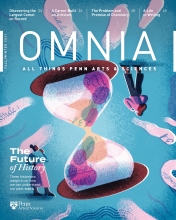Coming Full Circle
Ami Shah Brown, C’96, works on a DNA-based COVID vaccine, a technology she first witnessed as an undergraduate researcher.

Ami Shah Brown, C’96, says that it was an in-depth research opportunity at Penn as an undergraduate that inspired her career-long interest in DNA-based vaccines. Shah Brown is now the Senior Vice President of Regulatory Affairs at Inovio, a biotechnology company that develops and commercializes DNA vaccines and medicines to prevent and treat cancers and infectious diseases, including COVID-19. She is responsible for all strategic endeavors related to moving Inovio’s infectious diseases and immunology programs through regulatory processes, in the U.S. and around the world.
Here, Shah Brown discusses her career path, the role of DNA-based vaccines in the fight against COVID-19, and her advice for Penn students.
How did your undergraduate research experience influence your career path?
My Penn experience was foundational to my understanding of what I wanted in a future career. I was exposed to vaccine development as part of an undergraduate research opportunity. I worked on the bench—doing hands-on research—in the laboratory of former Penn Professor David Weiner in the mid-90s on one of the first clinical trials for DNA-based vaccines for HIV, which was novel at the time.
It was remarkable to be part of researching and developing methods for DNA-based vaccines as an undergraduate. I continued working on the bench for several years post-graduation, and from that experience I learned that I love the science of vaccine development. However, I also learned that I wanted to be more involved with applied work and exploring the design of large clinical trials. As a result, I decided to pursue a Master of Public Health degree at Emory University, and then a Ph.D. at The John Hopkins University’s Bloomberg School of Public Health.
How did you make your way from academia to Inovio?
My first work opportunity was with the Albert B. Sabin Vaccination Institute, a vaccine policy and advocacy organization based in Washington D.C. Around that time, the Institute received a grant from the Bill and Melinda Gates Foundation to become a regulatory sponsor for the development of vaccines for neglected tropical diseases. I had to learn and build drug development systems from the ground up. After about six years, the program was moved to Texas, and I started looking for new opportunities.
I had always kept in touch with my Penn network, including Professor Weiner, who, together with a former colleague, J. Joseph Kim, started VGX Pharmaceuticals, which later became Inovio Pharmaceuticals. Together with several members of our original Penn team, I’ve been at Inovio in Regulatory Affairs for more than a decade working on DNA-based vaccines for HIV and many different infectious diseases, the most recent being COVID-19, as well as exploring DNA-based approaches for immuno-oncology, which use the body’s immune system to fight cancer.
How did COVID-19 impact your work on vaccines?
I began working on COVID-19 before it even had a name. I was speaking with regulatory agencies about development programs for COVID-19 before the global pandemic was declared. DNA technology is well suited for quick action against this type of virus because it is only the genetic sequence that is needed to design a vaccine candidate because it is simply an application for an existing platform technology—the template for which has been previously utilized to bring other vaccine candidates into clinical trials. Inovio won the silver medal, so to speak, on getting a COVID vaccine from design to Phase 1 human testing in the United States. Inovio did it in 83 days, shortly after Moderna. Phase 3 efficacy evaluations have been initiated.
I began working on COVID-19 before it even had a name. I was speaking with regulatory agencies about development programs for COVID-19 before the global pandemic was declared.
The Inovio vaccine, like the HIV vaccines I worked on at Penn, is a DNA-based vaccine that has a lot of potential to fight COVID-19.
How might a DNA-based vaccine contribute to curbing the COVID-19 pandemic?
The Inovio DNA-based vaccine certainly has a role to play in curbing the COVID-19 global pandemic. First and foremost, DNA-based vaccines have demonstrated an excellent safety and tolerability profile and its role as a booster strategy is currently being evaluated. Inovio’s DNA-based vaccines have a favorable thermostability profile, which means they don’t require ultra-cold temperatures for transport and storage, which matters a lot in environments where cold storage poses a challenge. And finally, the cellular immune responses elicited by Inovio’s COVID-19 vaccine do not seem to be impacted by the recent variants of concern, lending support to the potential longer-term utility of a DNA-based approach for COVID-19 prevention.
You remain connected to the Penn community as part of the Professional Women’s Alliance. What keeps you wanting to engage?
Even though I did pursue a scientific pathway, I’m so appreciative of the broad-based liberal arts foundation I received at Penn. That foundation helped me to become a critical thinker and writer, which are skills I use every day and skills that are essential in most professions. I enjoy advising prospective students on why the liberal arts experience is so valuable. When I talk to students, I tell them that Penn has unlimited opportunities for growing your academic, personal, and professional foundations. Don’t limit yourself. Don’t be afraid to take any opportunity, explore every interest, and keep your options open.



